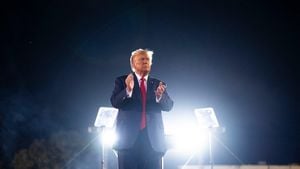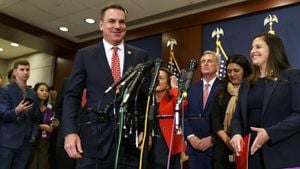Robert F. Kennedy Jr., known for his controversial views on vaccines and his prominent family background, has been appointed as the Secretary of the Department of Health and Human Services by President-elect Donald Trump. This decision marks an intriguing shift from Kennedy's previous roles as both an environmental advocate and critic of public health institutions.
The news broke when Donald Trump Jr. first announced the appointment on social media, with Trump confirming it shortly after. Kennedy's selection is tied to his earlier decision to endorse Trump after withdrawing from his independent presidential campaign.
The Department of Health and Human Services is one of the most influential agencies in the U.S., overseeing programs like Medicare, Medicaid, and the Food and Drug Administration (FDA). Trump's statement highlighted the agency's significance, asserting, "The Safety and Health of all Americans is the most important role of any Administration." Kennedy aims to revamp the HHS, addressing issues like chemical exposure and focusing on chronic disease prevention.
This nomination has alarmed many public health officials, particularly considering Kennedy's history of promoting vaccine skepticism and conspiracy theories. Over the years, he has made several controversial claims, including unfounded allegations linking vaccines to autism.
One of the core elements of Kennedy's platform is addressing the chronic disease epidemic affecting millions of Americans. He has stated, "We’re not going to take vaccines away from anybody," indicating some attempt at reassurance to critics. Nonetheless, experts are concerned about the potential elevation of anti-vaccine rhetoric within the HHS under his leadership.
Despite his family's storied political history, Kennedy's lack of conventional health policy experience stands out. Drew Altman, president of the Kaiser Family Foundation, noted the unconventional nature of his appointment, calling it "historical" and expressing uncertainty about how Kennedy will navigate the existing healthcare programs like Medicaid.
Polling results have revealed mixed public sentiment about Kennedy's nomination. Some individuals express support for his anti-establishment leanings, primarily due to their distrust of the pharmaceutical industry and governmental health agencies. Others fear these sentiments could exacerbate public health challenges, particularly as misinformation continues to circulate around vaccines and other health measures.
Throughout his career, Kennedy has actively criticized the FDA and CDC, often labeling them as entities co-opted by companies they were meant to regulate. Recently, he indicated intentions to make significant changes to these agencies and to revisit longstanding public health practices, such as the addition of fluoride to drinking water — a measure historically endorsed for its dental health benefits.
Factors contributing to vaccine hesitancy have become increasingly politicized, and Kennedy’s appointment could potentially deter vaccination efforts, according to public health experts. The stakes surrounding vaccine acceptance are high, with COVID-19 vaccination rates stalling and other immunization rates declining.
While Kennedy’s plans include aligning HHS with new public health priorities, he has faced backlash for his past statements and beliefs about vaccinations and other health interventions. This skepticism has drawn sharp criticism from mainstream health circles, raising questions about the safety and efficacy of vaccines, which have been proven effective against preventable diseases.
Some proponents of vaccination and medical professionals are worried about the possible consequences of having someone with Kennedy’s track record at the helm of such a powerful agency. Laura Haynes, a public health researcher, stated the gravity of the situation: “His appointment could create broader public health challenges if he elevates anti-vaccine sentiments at the federal level.”
Kennedy also leads the Children's Health Defense, the most well-funded organization opposing vaccines. His lengthy critique of government health policies contributes to the complexity of his role, highlighting the challenges he may face as he takes on this new responsibility.
Trump’s administration is already drawing intense scrutiny, with potential opposition anticipated during the Senate confirmation process for Kennedy. Health policy experts caution Republicans about backing Kennedy, stressing he might not require both independence and health policy expertise to effectively lead HHS.
Trump's objective with this appointment appears to be restoring public trust in health agencies, emphasizing transparency and scientific integrity. He proclaimed, "For too long, Americans have been crushed by the industrial food complex and drug companies who have engaged in deception, misinformation, and disinformation when it becomes to Public Health.”
Kennedy's public statements reflect his commitment to addressing environmental issues affecting health, focusing on pollutants and chemicals. If he assumes office, he likely will tackle the intersection of environment and health policy, creating frameworks to advance both realms.
Nevertheless, the potential for conflict is high; health advocates worry his approach could lead to intensified scrutiny of science-based public health recommendations. If his history of skepticism translates to action within HHS, the outcomes could ripple through vaccination efforts and other public health campaigns.
Experts are also concerned about Kennedy's views on reproductive rights. Earlier this year, he expressed support for abortion rights but later revised his stance, favoring restrictions after fetal viability. This ambiguity could lead to confusion and opposition from both sides of the political spectrum.
With significant structural challenges surrounding healthcare and public health, Kennedy has asserted his commitment to confronting chronic diseases like obesity and diabetes. His earlier messages about potentially stopping the addition of fluoride to drinking water indicate his unpredictable stance on health matters.
Though Kennedy's position is facing scrutiny from both public health officials and lawmakers, his policies will significantly impact the direction of the HHS. Observers across the political spectrum are closely watching the confirmation process, unsure what changes his administration might implement.
Overall, Kennedy’s nomination to lead the HHS embodies the contentious intersection between health, politics, and public trust. The response from both public and health sectors reflects growing anxiety about the future of public health policies amid resurging vaccine skepticism and conspiracy theories.
With Kennedy's unique background and controversial perspectives, his role as Secretary of Health and Human Services stands to reshape the agency at a time when public health struggles already face mounting pressures. Controversy is inherent to his work; how this will translate to actual policies at HHS remains to be seen, as stances become battle lines within the broader healthcare discourse in the upcoming months.



